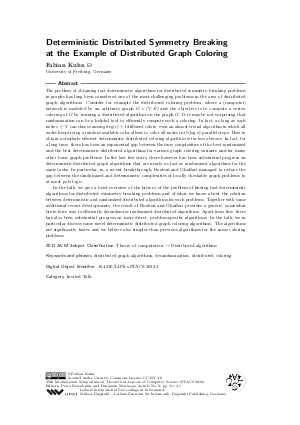Deterministic Distributed Symmetry Breaking at the Example of Distributed Graph Coloring (Invited Talk)
Author Fabian Kuhn
-
Part of:
Volume:
39th International Symposium on Theoretical Aspects of Computer Science (STACS 2022)
Part of: Series: Leibniz International Proceedings in Informatics (LIPIcs)
Part of: Conference: Symposium on Theoretical Aspects of Computer Science (STACS) - License:
 Creative Commons Attribution 4.0 International license
Creative Commons Attribution 4.0 International license
- Publication Date: 2022-03-09
File

PDF
LIPIcs.STACS.2022.3.pdf
- Filesize: 273 kB
- 1 pages
Document Identifiers
Subject Classification
ACM Subject Classification
- Theory of computation → Distributed algorithms
Keywords
- distributed graph algorithms
- derandomization
- distributed coloring
Metrics
- Access Statistics
-
Total Accesses (updated on a weekly basis)
0PDF Downloads0Metadata Views
Abstract
The problem of obtaining fast deterministic algorithms for distributed symmetry breaking problems in graphs has long been considered one of the most challenging problems in the area of distributed graph algorithms. Consider for example the distributed coloring problem, where a (computer) network is modeled by an arbitrary graph G = (V,E) and the objective is to compute a vertex coloring of G by running a distributed algorithm on the graph G. It is maybe not surprising that randomization can be a helpful tool to efficiently compute such a coloring. In fact, as long as each node v ∈ V can choose among deg(v)+1 different colors, even an almost trivial algorithm in which all nodes keep trying a random available color allows to color all nodes in O(log n) parallel steps. How to obtain a similarly efficient deterministic distributed coloring algorithm is far less obvious. In fact, for a long time, there has been an exponential gap between the time complexities of the best randomized and the best deterministic distributed algorithms for various graph coloring variants and for many other basic graph problems. In the last few years, there however has been substantial progress on deterministic distributed graph algorithms that are nearly as fast as randomized algorithms for the same tasks. In particular, in a recent breakthrough, Rozhoň and Ghaffari managed to reduce the gap between the randomized and deterministic complexities of locally checkable graph problems to at most polylog n. In the talk, we give a brief overview of the history of the problem of finding fast deterministic algorithms for distributed symmetry breaking problems and of what we know about the relation between deterministic and randomized distributed algorithms for such problems. Together with some additional recent developments, the result of Rozhoň and Ghaffari provides a generic, somewhat brute-force way to efficiently derandomize randomized distributed algorithms. Apart from this, there has also been substantial progress on more direct, problem-specific algorithms. In the talk, we in particular discuss some novel deterministic distributed graph coloring algorithms. The algorithms are signficantly faster and we believe also simpler than previous algorithms for the same coloring problems.
Cite As Get BibTex
Fabian Kuhn. Deterministic Distributed Symmetry Breaking at the Example of Distributed Graph Coloring (Invited Talk). In 39th International Symposium on Theoretical Aspects of Computer Science (STACS 2022). Leibniz International Proceedings in Informatics (LIPIcs), Volume 219, p. 3:1, Schloss Dagstuhl – Leibniz-Zentrum für Informatik (2022)
https://doi.org/10.4230/LIPIcs.STACS.2022.3
BibTex
@InProceedings{kuhn:LIPIcs.STACS.2022.3,
author = {Kuhn, Fabian},
title = {{Deterministic Distributed Symmetry Breaking at the Example of Distributed Graph Coloring}},
booktitle = {39th International Symposium on Theoretical Aspects of Computer Science (STACS 2022)},
pages = {3:1--3:1},
series = {Leibniz International Proceedings in Informatics (LIPIcs)},
ISBN = {978-3-95977-222-8},
ISSN = {1868-8969},
year = {2022},
volume = {219},
editor = {Berenbrink, Petra and Monmege, Benjamin},
publisher = {Schloss Dagstuhl -- Leibniz-Zentrum f{\"u}r Informatik},
address = {Dagstuhl, Germany},
URL = {https://drops.dagstuhl.de/entities/document/10.4230/LIPIcs.STACS.2022.3},
URN = {urn:nbn:de:0030-drops-158131},
doi = {10.4230/LIPIcs.STACS.2022.3},
annote = {Keywords: distributed graph algorithms, derandomization, distributed coloring}
}
